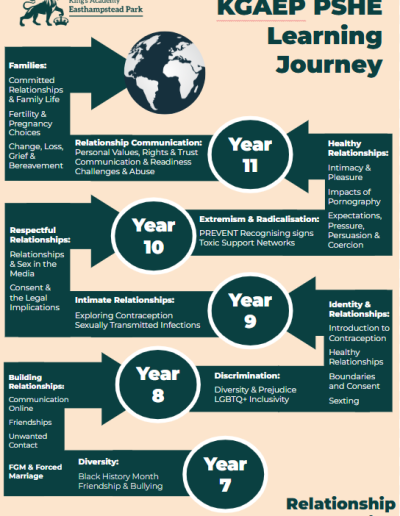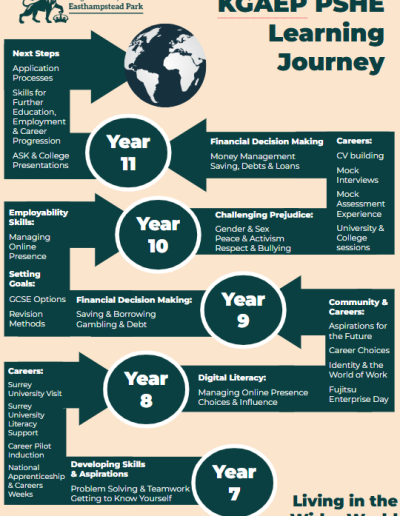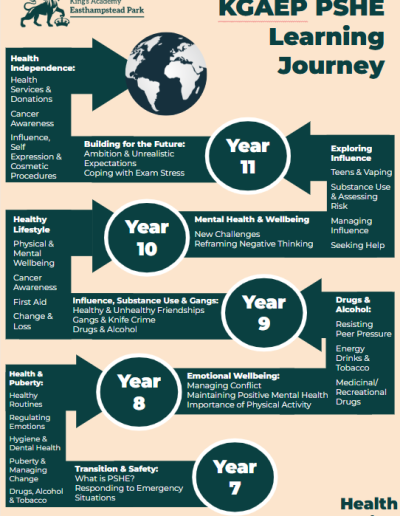Relationships and Sex Education
view our policies:
Relationships and Sex Education (RSE) forms an important part of the PSHE programme. The lessons should build upon previous knowledge and be informative and educational, thus enabling students to make informed decisions in the future. We would like to highlight the topics that are being covered in each year group so that you can be prepared for any questions your child may ask at home. Although these lessons are obviously guided by the teacher, sessions are often led by the questioning from students so please be aware that lessons are not limited to solely these topics and other areas may be discussed. Each session will use a variety of resources ranging from books, worksheets, powerpoints, and videos. This part of the course will be covered during the following time frames:
Year 9 will discuss morality and the law surrounding sexual activity as well as discussing STIs and contraception during their lessons in March.
Year 10 will discuss RSE during their lessons between May and July – Understanding the role of intimacy in relationships, what enthusiastic consent looks and feels like, when asking for consent becomes inappropriately pressurising or persuasive and the legal consequences of this. THey will also learn about the impacts of pornography on the understanding and expectations surrounding consent and understand how to challenge inaccurate and dangerous messages perpetrated by pornography.
Year 11 RSE will focus more on changing relationships and family, addressing new challenges that students will face after school. Lessons will look at marriage, parenthood, fertility and pregnancy choices as well as assertive communication in regards to contraception and loss and bereavement.
Clicking below shows the topics each year group will learn about.
Year 7
Topics Covered in Year 7
What is PSHE?
Black History Month
Getting To Know Yourself
Developing skills and aspirations: Problem solving and team work
Basic first aid: how to respond in an emergency situation
Friendship and bullying
Healthy routines
Regulating emotions
Communicating online
Hygiene and dental health
Puberty and managing change
Relationships and boundaries
Unwanted contact
FGM and forced marriage
Drugs, alcohol and tobacco
Body satisfaction and self acceptance
Year 8
Topics Covered in Year 8
What is PSHE?
Black History Month
British Values
Energy drinks and tobacco
Medicinal/recreational drugs and managing influences
Diversity and prejudice
Managing online presence, choices and influences
Resisting peer pressure
Introduction to contraception
Aspirations for the future and career choices
Identity and the world of work
Healthy relationships
Boundaries and consent
LGBTQ+ inclusivity
Sexting
Managing conflict
Maintaining positive mental health
Importance of physical activity
Year 9
Topics Covered in Year 9
What is PSHE?
Black History Month
Physical and mental wellbeing
Healthy and unhealthy friendships
Gangs and knife crime
Drugs and alcohol
Managing online presence and social media
GCSE options
Change, loss and bereavement
Financial decisions, saving and borrowing
Gambling, financial choices
Consent
Relationships and sex in the media
STI’s – Students will understand what STI’s are
Contraception
Cancer awareness
First aid
Revision methods
Year 10
RSE Healthy Relationships
Intimacy and Pleasure
To know what enthusiastic consent looks and feels like
To understand how to assess the importance of readiness for intimacy as an individual and as a couple
To be able to explain the role that communication and respect play in healthy relationships and consent
Impacts of Pornography
To know the law relating to pornography and sharing explicit images
To understand the impact pornography can have on people’s understanding and expectations of consent
To be able to challenge inaccurate and dangerous messages perpetuated by pornography, about sexuality, gender, and consent
Expectations, Pressure, Persuasion and Coercion
To know the law relating to pornography and sharing explicit images
To understand the impact pornography can have on people’s understanding and expectations of consent
To be able to challenge inaccurate and dangerous messages perpetuated by pornography, about sexuality, gender, and consent
Year 11
RSE Relationship Communication
Personal Values
Assertive Communication
Challenges and Abuse
RSE Families
Committed Relationships and Family Life
Fertility and Pregnancy Choices
Change, Loss, Grief and Bereavement
















